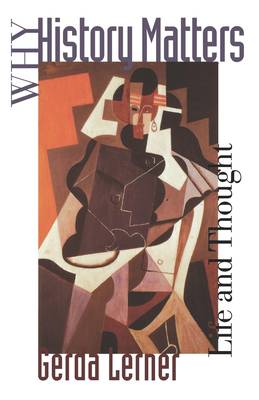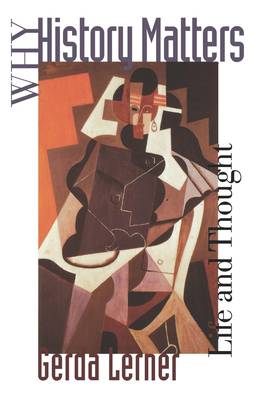
- Retrait gratuit dans votre magasin Club
- 7.000.000 titres dans notre catalogue
- Payer en toute sécurité
- Toujours un magasin près de chez vous
- Retrait gratuit dans votre magasin Club
- 7.000.000 titres dans notre catalogue
- Payer en toute sécurité
- Toujours un magasin près de chez vous
Description
"All human beings are practicing historians," writes Gerda Lerner. "We live our lives; we tell our stories. It is as natural as breathing." It is as important as breathing, too. History shapes our self-definition and our relationship to community; it locates us in time and place and helps to give meaning to our lives. History can be the vital thread that holds a nation together, as demonstrated most strikingly in the case of Jewish history. Conversely, for women, who have lived in a world in which they apparently had no history, its absence can be devastating. In Why History Matters, Lerner brings together her thinking and research of the last sixteen years, combining personal reminiscences with innovative theory that illuminate the importance of history and the vital role women have played in it.
Why History Matters contains some of the most significant thinking and writing on history that Lerner has done in her entire career--a summation of her life and work. The chapters are divided into three sections, each widely different from the others, each revelatory of Lerner as a woman and a feminist. We read first of Lerner's coming to consciousness as a Jewish woman. There are moving accounts of her early life as a refugee in America, her return to Austria fifty years after fleeing the Nazis (to discover a nation remarkable both for the absence of Jews and for the anti-Semitism just below the surface), her slow assimilation into American life, and her decision to be a historian. If the first section is personal, the second focuses on more professional concerns. Included here is a fascinating essay on nonviolent resistance, tracing the idea from the Quakers (such as Mary Dyer), to abolitionists such as Theodore Dwight Weld (the "most mobbed man" in America), to Thoreau's essay Civil Disobedience, then across the sea to Tolstoy and Gandhi, before finally returning to America during the civil rights movement of the 1950s. There are insightful essays on "American Values" and on the tremendous advances women have made in the twentieth century, as well as Lerner's presidential address to the Organization of American Historians, which outlines the contributions of women to the field of history and the growing importance of women as a subject of history. The highlight of the final section of the book is Lerner's bold and innovative look at the issues of class and race as they relate to women, an essay that distills her thinking on these difficult subjects and offers a coherent conceptual framework that will prove of lasting interest to historians and intellectuals.
A major figure in women's studies and long-term activist for women's issues, a founding member of NOW and a past president of the Organization of American Historians, Gerda Lerner is a pioneer in the field of Women's History and one of its leading practitioners. Why History Matters is the summation of the work and thinking of this distinguished historian.
Why History Matters contains some of the most significant thinking and writing on history that Lerner has done in her entire career--a summation of her life and work. The chapters are divided into three sections, each widely different from the others, each revelatory of Lerner as a woman and a feminist. We read first of Lerner's coming to consciousness as a Jewish woman. There are moving accounts of her early life as a refugee in America, her return to Austria fifty years after fleeing the Nazis (to discover a nation remarkable both for the absence of Jews and for the anti-Semitism just below the surface), her slow assimilation into American life, and her decision to be a historian. If the first section is personal, the second focuses on more professional concerns. Included here is a fascinating essay on nonviolent resistance, tracing the idea from the Quakers (such as Mary Dyer), to abolitionists such as Theodore Dwight Weld (the "most mobbed man" in America), to Thoreau's essay Civil Disobedience, then across the sea to Tolstoy and Gandhi, before finally returning to America during the civil rights movement of the 1950s. There are insightful essays on "American Values" and on the tremendous advances women have made in the twentieth century, as well as Lerner's presidential address to the Organization of American Historians, which outlines the contributions of women to the field of history and the growing importance of women as a subject of history. The highlight of the final section of the book is Lerner's bold and innovative look at the issues of class and race as they relate to women, an essay that distills her thinking on these difficult subjects and offers a coherent conceptual framework that will prove of lasting interest to historians and intellectuals.
A major figure in women's studies and long-term activist for women's issues, a founding member of NOW and a past president of the Organization of American Historians, Gerda Lerner is a pioneer in the field of Women's History and one of its leading practitioners. Why History Matters is the summation of the work and thinking of this distinguished historian.
Spécifications
Parties prenantes
- Auteur(s) :
- Editeur:
Contenu
- Nombre de pages :
- 272
- Langue:
- Anglais
Caractéristiques
- EAN:
- 9780195122893
- Date de parution :
- 26-02-98
- Format:
- Livre broché
- Format numérique:
- Trade paperback (VS)
- Dimensions :
- 140 mm x 216 mm
- Poids :
- 340 g







